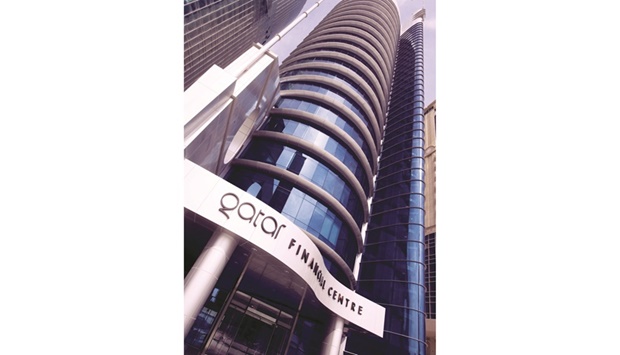The Qatar Financial Centre (QFC), which has as many as 65 fintech companies as of now, has suggested tokenisation in the country's real estate sector, which is currently over supplied, according to Yousuf Mohamed al-Jaida, its chief executive.
Finding that 80-85% of the market is not accessible to public; he told the second Qatar Economic Forum, powered by Bloomberg, that "tokenisation in the real estate becomes a plausible solution to address the problems in the sector."
Tokenisation is like crowdfunding, breaking up the value of a real estate investment into smaller chunks. Each fraction of a real estate asset is converted into a token, and then encrypted with all the details that grant ownership.
"So creating regulations around digital assets and tokenisation will be required to address the problems. We look at the market how it reacts and then step in if regulations are required," he said.
The real estate is currently over supplied and there have been issues in terms of valuation and pricing although residential complexes and apartments are doing well, he said, adding there are segments in the real estate that have been suffering since 2017.
Highlighting that the fintech companies are redrawing the financial services industry; he said the trend is that financial institutions are embracing disruptions and are also becoming disruptors.
"We see a lot of acquisition between financial institutions and technological companies. What we also see is that most of the blue-chip financial institutions are partnering with existing technological companies," he said.
Stressing that fintech companies need customers and financial institutions need data, so it is win-win situation, he said given the trend, the QFC has taken a liberal approach to allow most fintech companies across multiple service lines to establish and register in the QFC without regulations.
The idea is that if you are a technology company, the QFC will treat it as an ICT (information, communication and technology) entity, he said.
The QFC perceives that around 80% of fintechs do not require regulation, given that they develop the underlying technologies such APIs, AI and blockchain, and provide them directly to financial institutions that themselves act as depository institutions.
If fintechs accept deposit and provide credit, they would be mandated to use the existing infrastructure, which is already regulated in the market.
"We have more than 65 fintech companies currently under the QFC and most of them leverage upon the existing infrastructure in the industry," al-Jaida said.
Qatar has made remarkable progress in the fintech space in a very short time. Several major developments have taken place in 2021, including the launch of Qatar’s National Fintech Strategy, the Qatar Fintech Hub (QFTH) and its incubator and accelerator programmes as well as the QFC Fintech Circle and Tech Talk series.
In its Qatar Fintech Report 2021, the QFC said Islamic Fintech is expected to experience "significant" growth in coming years and Qatar has the opportunity to secure a unique advantage over other Islamic FinTech hubs through Shariah-compliant venture capital.
Finding that 80-85% of the market is not accessible to public; he told the second Qatar Economic Forum, powered by Bloomberg, that "tokenisation in the real estate becomes a plausible solution to address the problems in the sector."
Tokenisation is like crowdfunding, breaking up the value of a real estate investment into smaller chunks. Each fraction of a real estate asset is converted into a token, and then encrypted with all the details that grant ownership.
"So creating regulations around digital assets and tokenisation will be required to address the problems. We look at the market how it reacts and then step in if regulations are required," he said.
The real estate is currently over supplied and there have been issues in terms of valuation and pricing although residential complexes and apartments are doing well, he said, adding there are segments in the real estate that have been suffering since 2017.
Highlighting that the fintech companies are redrawing the financial services industry; he said the trend is that financial institutions are embracing disruptions and are also becoming disruptors.
"We see a lot of acquisition between financial institutions and technological companies. What we also see is that most of the blue-chip financial institutions are partnering with existing technological companies," he said.
Stressing that fintech companies need customers and financial institutions need data, so it is win-win situation, he said given the trend, the QFC has taken a liberal approach to allow most fintech companies across multiple service lines to establish and register in the QFC without regulations.
The idea is that if you are a technology company, the QFC will treat it as an ICT (information, communication and technology) entity, he said.
The QFC perceives that around 80% of fintechs do not require regulation, given that they develop the underlying technologies such APIs, AI and blockchain, and provide them directly to financial institutions that themselves act as depository institutions.
If fintechs accept deposit and provide credit, they would be mandated to use the existing infrastructure, which is already regulated in the market.
"We have more than 65 fintech companies currently under the QFC and most of them leverage upon the existing infrastructure in the industry," al-Jaida said.
Qatar has made remarkable progress in the fintech space in a very short time. Several major developments have taken place in 2021, including the launch of Qatar’s National Fintech Strategy, the Qatar Fintech Hub (QFTH) and its incubator and accelerator programmes as well as the QFC Fintech Circle and Tech Talk series.
In its Qatar Fintech Report 2021, the QFC said Islamic Fintech is expected to experience "significant" growth in coming years and Qatar has the opportunity to secure a unique advantage over other Islamic FinTech hubs through Shariah-compliant venture capital.


